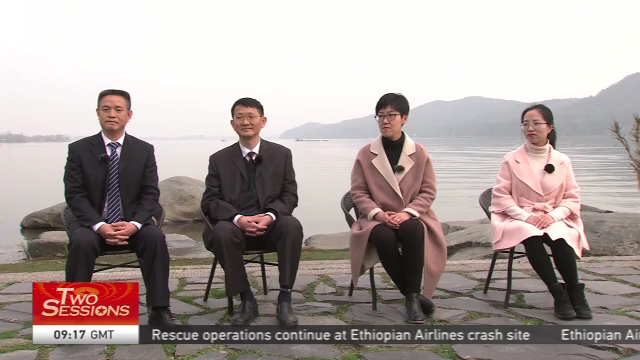
18:56, 11-Mar-2019
NPC & CPPCC Special: CGTN Listens: Ecological recovery and environmental protection of Yangtze River
Updated
18:50, 14-Mar-2019
07:18

The minister mentioned the Yangtze River Delta region there, and the health of Asia's longest river is certainly a concern for the many people who depend on it for their livelihoods. This is also a key topic at the political meetings in Beijing. In this edition of CGTN Listens, our reporter Xia Ruixue sat down with a number of people from Wuhan, a major city on the river, and got their thoughts on how the iconic waterway could be better protected.
XIA RUIXUE WUHAN "Hello and welcome to this edition of CGTN Listens. I'm Xia Ruixue. Today we're in Wuhan, a city located along the middle reaches of the Yangtze River. The river is the third longest worldwide and it's the busiest inland river in the world. We call it a golden waterway. But how to balance its economic development and environmental protection remains a big question."
Joining us to talk about this are Mr. Zhong Zhengrong, from the Wuhan Municipal Development and Reform Commission, Mr. Wang Hongzhu, a researcher at the Institute of Hydrobiology of the Chinese Academy of Sciences, Ms. Huang Huan, an English teacher at Wuhan Number 49 High School and Ms. Liu Xuan, a volunteer with "Wuhan Volunteers Association of Lake Savers", an outreach group.
Welcome to you all!
Ms Huang, you're a local resident. You've been living here for more than 30 years. Can you recall what the city and its rivers and lakes were like in your childhood? And what happened later?
XIA RUIXUE WUHAN "Well, Mr. Wang, you've been doing research on the environmental protection of the Yangtze River for many years. What's the current situation? How bad is it?"
XIA RUIXUE WUHAN "Ms. Liu, you're a volunteer who is fighting to protect the water. What are the biggest difficulties when doing it?"
XIA RUIXUE WUHAN "Mr. Zhong, what specific measures has Wuhan's government introduced?"
ZHONG ZHENGRONG WUHAN MUNICIPAL DEVELOPMENT AND REFORM COMMISSION "We started with a crackdown campaign along the Yangtze River. Since 2016, a total of 227 illegal docks along the 145-kilometer bank have been demolished. The illegal sand excavation activities were terminated. Then, we worked on curbing the dumping of wastewater along the Yangtze River. The latest technologies are now being used to monitor all sewage outlets and help trace sources of pollution. So far, we have appointed 2,699 river and lake chiefs, who have played a significant role in improving the quality of the city's water.
XIA RUIXUE WUHAN "That's a huge amount of work. It must require coordination efforts across state ministries, provinces and departments along the Yangtze River. Mr Zhong, is it hard to break down administrative barriers to work with various parties directly on restoration work?"
ZHONG ZHENGRONG WUHAN MUNICIPAL DEVELOPMENT OF REFORM COMMISSION "A joint administrative office was established in Wuhan, which developed a clear roadmap and timetable for the environmental protection of the Yangtze River. The office is to break the local protectionism and ask relevant departments to make concerted efforts to solve environmental problems."
XIA RUIXUE WUHAN "What do you think is the best way to balance economic development and environmental protection?"
ZHONG ZHENGRONG WUHAN MUNICIPAL DEVELOPMENT OF REFORM COMMISSION "Wuhan used to be a heavy manufacturing base, which in turn, brought it a great deal of pollution. Within the past decade, we have made efforts to promote supply-side structural reform. We keep upgrading and transforming its industries. Today, its optical fiber, automotive, and commercial space industries are thriving. Its GDP has increased. At the same time, the environment proves to be better. So, I think economic structure and developments will determine whether or not we are seeing a better environment."
XIA RUIXUE WUHAN "Mr. Wang, from your research, what are the biggest challenges for the future in preserving the ecological environment?"
XIA RUIXUE WUHAN "The Yangtze River Economic Belt covers 11 of China's provinces and municipalities and accounts for over 40 percent of China's population and GDP. Since 2014, President Xi Jinping has kept stressing green development for boosting economic growth within the belt. As the experts have said, we have made progress in ecological restoration and protection. But we still have a long way to go. Thank you very much for joining us. I'm CGTN's Xia Ruixue. We'll see you next time."

SITEMAP
Copyright © 2018 CGTN. Beijing ICP prepared NO.16065310-3
Copyright © 2018 CGTN. Beijing ICP prepared NO.16065310-3